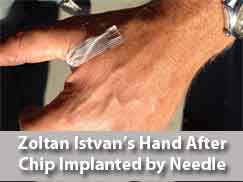From SCDigest's OnTarget e-Magazine
- Oct. 1, 2015 -
RFID and AIDC News: Time to Get Your RFID Implant? Plus Levi's Pilot Success with Intel RFID Platform
Transhumanist Says RFID Implants are the Way to Go, While Levi's Achieves Nearly 100% Inventory Acurracy In Store
SCDigest Editorial Staff
SCDigest has written several times in the past about humans getting RFID implants, such as a man named Amal Graafstra did in the state of Washington in 2010.
Graafstra has two different chips embedded one in each hand, and he uses this technology to open his garage door, turn on his computer and much more by simply waving his hand at them. He even convinced a girlfriend to get a chip in one of her hands. (See Are RFID Tagged Humans Closer than we Think?)
SCDigest Says: |
 |
Levi's was able to achieve nearly 100% inventory accuracy within a few days of system go-live. |
|
What Do You Say?
|
|
|
|
The earlier this year we published an article about office complex in Sweden that was encouraging workers there to also get RFID implants and use them to do such things as pay for lunch, access the copy machine, open office doors and more. (See Office Complex in Sweden Offers Option of Embedded RFID for Workers to Automate Access, Buy Lunch.)
Not much word since then as to how the program is coming along. We are thinking rather slowly.
Now transhumanist Zoltan Istvan is among the latest to jump on the bandwagon. What is a transhumanist, you ask? Someone who believes the idea that human capacity can be enhanced by technology.
So Istvan recently got his first RFID implant at the same time a buddy did as well. Apparently he has no real applications to use the new chip implant yet, but in a recent web post he is optimistic the chip's ability to "store information and unlock devices, among other things," will eventually come in handy. He did see someone who could start their car with the RFID implant they had acquired.
Istvan is running for US president as head of Transhumanist Party, by the way.
So how does this implant happen?
"This involved a simple 60-second injection procedure. The implant was placed into our hands through a thick and slightly intimidating needle," Istvan wrote, but said the procedure was largely pain free.
If you want to take the transhumanist thing even further, Istvan says there is a brain implant available that promises to allow adopters to listen to music wirelessly in their heads. Let's hope the chips run the Apple mobile operating system.
 We'll keep you posted, but think we'll wait here until a few more applications are developed before getting our own RFID implants. We'll keep you posted, but think we'll wait here until a few more applications are developed before getting our own RFID implants.
Intel Releases Retail RFID Platform, Levi's Test Shows Strong Result
SCDigest reported last January that at the NRF show that tech giant Intel was demonstrating an in-store reader system that it said would make deploying item-level RFID in retail much simpler and faster, arguing that the time and cost it took to deploy RFID in retail was holding adoption back.
(RFID and AIDC Story Continued Below)
|